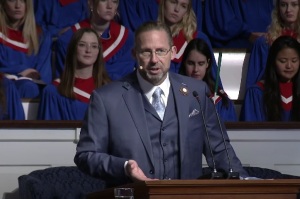Scientists Announce Near Discovery of 'God Particle'
Scientists at a nuclear research facility in Switzerland announced Wednesday a milestone in their decades-long hunt for a subatomic particle, known as the "God particle," which should help explain why objects have mass and answer other fundamental questions about the universe.
"We have now found the missing cornerstone of particle physics," Rolf Heuer, director of the European Center for Nuclear Research (CERN), told scientists at a press conference, according to The Associated Press.
"As a layman, I think we did it," he told the crowd. "We have a discovery. We have observed a new particle that is consistent with a Higgs boson."
The "God particle," which gives the particles that make up atoms their mass and is also referred to as the Higgs boson particle, is the missing piece of the fundamental theory of physics known as the Standard Model. Without this mass, these particles would zip through the cosmos at the speed of light, unable to bind together to form the atoms that make up everything in the universe.
Two independent teams at CERN said they have both "observed" a new subatomic particle -- a boson. Heuer called it "most probably a Higgs boson, but we have to find out what kind of Higgs boson it is."
In a short online video accidentally published by the Geneva, Switzerland-based CERN (European Organization for Nuclear Research) on Tuesday, spokesman Joe Incandela could be seen describing how physicists at the Large Hadron Collider, a gigantic scientific instrument about 100 meters underground, had "observed a new particle."
However, a CERN physicist had told Reuters the discovery was not necessarily definitive. "This is not a black and white answer which you should expect. This is an important stepping stone," Peter Jenni, former spokesman for CERN, was quoted as saying.
"The Standard Model has a few major flaws; the Higgs boson discovery would only fix one of them," Canadian physicist Pauline Gagnon at CERN was earlier quoted as saying. "We still have no clue regarding what makes 96 percent of the content of the universe. This should keep us physicists busy for a few more decades."
Five leading theoretical physicists, including Peter Higgs, the Edinburgh University emeritus professor of physics that the particle is named after, were at the press conference in Switzerland.
Thousands of physicists have been involved in the research at CERN, divided into two separate teams called Atlas and CMS, for decades to discover the particle first proposed in theory by British physicist Higgs in 1964. The collider they have used smashes beams of protons – sub-atomic particles – together at close to the speed of light, recreating the conditions that existed a fraction of a second after the Big Bang.
The phrase "God particle" was coined by Nobel Prize-winning physicist Leon Lederman.
U.S. physicists had also claimed Monday they had found the strongest evidence yet of the existence of the Higgs in a mass of data collected from the Tevatron particle accelerator, run by the Fermi National Accelerator Lab outside Chicago.
"It will be interesting to see how it lines up with CERN's results on Wednesday," CERN spokesman James Gillies told Reuters.





























